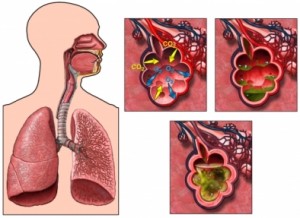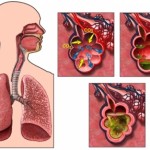Last Updated on September 15, 2010 by Bryan Dastan
According to some studies, around 60,000 Americans are dying every year due to bacterial pneumonia. Bacterial pneumonia not only infects infants easily but also elderly people. But a few precautionary measures would prevent this disease. Read this article and learn how to fend yourself from this deadly disease…
Bacterial Pneumonia Causes
Bacterial pneumonia is caused by bacterial infection in the lungs. Besides bacteria, pneumonia results due to viral agents, fungus and other organisms. Some of the common ways by which a person may get infected are as follow:
• When a person comes in contact with another person suffering from bacterial pneumonia
• When a person touches something which is contaminated with bacteria
• When a person breathes in infected air droplets spread by people with bacterial pneumonia
Additionally, bacterial infection may also be caused in a person with weak immune system. If the immune system is too weak, bacterial infection would play havoc with the body mechanism.
There are a number of bacteria which may cause bacterial pneumonia, but, among them, Streptococcus pneumoniae stands at the top of the infection-causing-list. Other types of bacteria that may develop into bacterial pneumonia are:
• Chlamydia trachomatis
• Legionella pneumophilia
• Mycoplasma pneumoniae.
• Haemophilus influenzae
Symptoms of Bacterial Pneumonia
There are a number of symptoms to identify bacterial pneumonia. They are as follows:
• Headaches
• High fever
• Thick green or yellow phlegm
• Phlegm-producing cough
• Chills
• Clammy skin
• Fatigue
• Loss of appetite
• Shallow breathing
• Shortness of breath
• Stabbing chest pain
• Sweating
Symptoms due to bacterial pneumonia in infants
Bacterial pneumonia is considered as the second largest cause of death in children under the age of five. Symptoms shown by the children due to bacterial pneumonia are as follows:
• High fever
• Vomiting
• Chest pain
• Chest retractions
• Grunting while breathing
• Increased breathing rate
• Irritability
• Poor feeding
How bacterial pneumonia could cause serious health complications?
Bacterial pneumonia can cause serious health complications in the following ways:
• Blood infections: Bacteria attack blood cells which lead to a condition called bacteremia. The blood infection is capable of infecting organs and, therefore, requires a medical emergency.
• Fluid buildup: Bacterial infections can cause accumulation of fluid between the lungs and the pleurae (the membrane that lines the inner chest).
• Lung inflammation: Bacterial attack on the lungs could be dangerous as it may cause swelling of lungs. Severe lung inflammation would prevent sufficient exchange of oxygen between the lungs and blood.
• Besides these, cigarette smoke could wreak havoc to the lung’s ability to get rid of unwanted remnants in the body. Consequently, this would increase the risk of bacterial infection and subsequent pneumonia.
• Furthermore, alcohol abuse is also a risk factor for pneumonia.
Treatment for Bacterial Pneumonia
Bacterial pneumonia could cause serious problem to the health. However, if neglected, it would mix with the blood and turn out to be a life threatening disease. Hence, diagnosing the problem on time is very essential. Attempting to self-treat bacterial pneumonia is highly discouraged.
Medicines for bacterial pneumonia
For bacterial pneumonia, antibiotics are the best treatment. It is also important to complete the course of medication prescribed by the doctor as cutting antibiotic treatment short often causes regeneration of bacteria. In other words, incomplete intake of a course of antibiotics would leave antibiotic-resistant strains of bacterial pneumonia in the body, which would multiply after few days.
In severe cases, mechanical ventilation devices are used.
Although bacterial infection could cause serious damage to the lungs, it would be ward off by following simple hygienic techniques. But if it gets severe, the rational step is to consult doctor and take the required medications.


